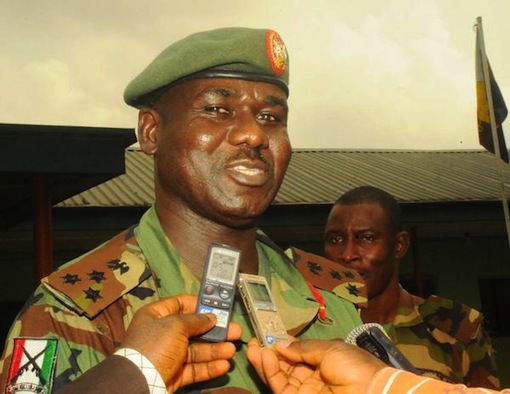Buratai’s Coup Scare: Between Denial And Reality
By Francis Abayomi
Nigeria’s Chief of Army Staff, Lieutenant General Tukur Buratai’s has undoubtedly stirred the hornet’s nest. His recent allegation that some soldiers may have surreptitiously been hobnobbing with politicians; purportedly in desperation to achieve inordinate ambition is eliciting deafening reactions. Unfortunately, the allegation as weighty as it would appear remains hazy and largely unsubstantiated as no suspect has been named or evidence proffered. Nevertheless, when considered squarely and dispassionately, it is either General Burutai was being proactive in discountenancing certain posturing potentially inimical to legitimate democratic authority or he was simply carrying out the unenviable task of a scaremonger with the view to exploit prevailing political situation to shore-up his popularity or credibility. To be sure, the possibility of scaremongering could hardly be ruled out in a country where crave for cheap heroism often assume peculiar hue of patriotism; depending on prevailing political temperament.
What began with a statement by the Spokesperson of the Nigerian Army, Brigadier General Sani Usman has since snowballed into a national debate which Buratai apparently didn’t bargain for. Perhaps, the army chief would by now be ruing his choice of engaging the public in a coup scare. He could have handled whatever the situation was silently by deploying his command architecture to ward-off petulant soldiers and the so-called disgruntled politicians; including applying the necessary sanctions against culprits. But it shouldn’t be that the army chief was at a lost on how best to handle the issue otherwise his charge ordinarily amounts to insinuating a plot against a democratically elected government which should not be taken lightly. Or could it be that unease in the military has become so precarious; demanding a clarion call for vigilance from the Nigerian public?
However, for reasons generally considered untoward for the health of the democratic process, the statement generally perceived as red alert may in actual fact has exacerbated more tension than the threat General Buratai had hoped to douse. Indeed, it is least surprising that Buratai’s caution is being interpreted as a warning about the possibility of coup whose omen may be in the offing. Coming against the backdrop of the prevailing political situation that is fraught with deep-seated uncertainties, the enormous dusts raised, thus far, by statement credited to the army chief and the consequential palpable momentum that continues to resonate so intensely are not unexpected. The challenge however remains that Nigeria is in a most inauspicious era in history when coup scare has become so plausible beyond the usual culture of denials which serve as substrate upon which the polity has thrived for decades.
If the army chief thought he was doing a simple patriotic assignment with a stern warning to military officers to be weary of politicians who could influence them to dabble into politics or meddle in political activities, he probably did not appreciate that the fragile nature of prevailing politics cautions to the contrary. Although Nigerians, in the usual hysteria are bound to subject the statement from the high command of the military to different interpretations, however there appears to be consensus that Buratai’s alert was not without some trepidations beyond mere insinuations. Otherwise, if there were no scenarios suggesting a level of culpability; regardless of how severe, it would boil down to the army chief taking undue advantage of his position to feel the pulse of the nation or by indulging in dangerous political mischief.
Bit beyond General Buratai’s statement, the truth simply remain that with the manifest shenanigans of the political class, not a few Nigerians contemplate the possibility of military intervention willy-nilly; even if the overwhelming consensus is that military rule is never an option in the prevailing circumstances. Indeed, politicians and their allies in the military contemplating military intervention would be utterly disappointed at the passive resistant such venture will attract from the public; simply because federating units that make up the entity called Nigeria are dissatisfied with the prevailing federalism foisted by the military and its power oligarchies. The already disenchanted federating units in their overwhelming majority will most unlikely succumb to renewed gamble with unitary system under a new generation of despots; no matter how convincing their charismatic or messianic agenda may appear.
Unfortunately, it is not certain General Buratai and his fellow military commanders appreciate the reality that have made military intervention no longer plausible in the circumstance beyond denials that may even tend to justify such misadventure. It should therefore be clear to General Burutai, in his apparently well-conceived venture of denouncing coup plots in his constituencies, that such misadventure would come to utter grief; not on the strength of counter-military might, but on the strength of sheer resolve of the federating units to resist any act of revisionism or any machination that make military rule seemingly attractive. The challenge is such that Nigerians appear determined to resist the evil of military rule if and when it thus happens, but overwhelming majority of citizens may not be willing to take the risk of defending discredited operators of a failing democracy if the system eventually faces the jeopardy of military coup. But the boys in the military and their political collaborators should realise the battle ahead would not be about the preservation of their hegemonies but about the rest of us in the light of the reality that stares us in the face in the collective interests of our children and generations yet unborn.
This article first featured in HARDBEAT COLUMN; INDEPENDENT SUNDAY, 21st May, 2017

